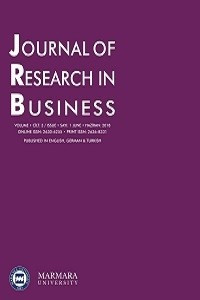HALK OYLAMALARI VE HİSSE PİYASASI GETİRİLERİ: BORSA İSTANBUL’DAN BULGULAR
ELECTIONS AND STOCK MARKET RETURNS: EVIDENCE FROM BORSA ISTANBUL
Stock prices may display predictable patterns around major political events, particularly in emerging market economies where political risk is a key component of asset risk premiums. One distinct event that would be expected to result in an abrupt increase in political risk is elections. Motivated by this notion, we study the returns for a set of indicator and sectoral indices of Borsa Istanbul stocks and the U.S. Dollar–Turkish Lira exchange rate around political elections held in Turkey over 2001–2020. Our tests reveal an accumulation of economically and statistically significant positive abnormal returns for all Borsa Istanbul stock indices and negative abnormal returns for the U.S. Dollar–Turkish Lira exchange rate over a window that starts as early as a month prior to the election date and extends for two weeks into the post-election period, with the effect being particularly strong in the week immediately following the election. Consistent with a political risk-based story, volatility of index returns starts increasing over the same period and plateaus out at a level that is roughly one-and-a half to two-folds greater than its pre-election period average.
Keywords:
Political risk, elections, stock market, abnormal returns Borsa Istanbul,
___
- Aastveit, K. A., Natvik, G. J., & Sola, S. (2017). Economic Uncertainty and the Influence of Monetary Policy. Journal of International Money and Finance 76. 50–67.
- Ariel, R. A. (1987). A Monthly Effect in Stock Returns. Journal of Financial Economics 18, 161–174.
- Aschauer, D. A. (1989). Is Public Expenditure Productive? Journal of Monetary Economics 23. 177-200.
- Białkowski, J., Gottschalk, K., & Wisniewski, T. P. (2008). Stock Market Volatility around National Elections. Journal of Banking & Finance 32, 1941–1953.
- Bilson, C. M., Brailsford, T. J., & Hooper, V. J. (2002). The Explanatory Power of Political Risk in Emerging Markets. International Review of Financial Analysis 11. 1–27.
- Boehmer, E., Masumeci, J., & Poulsen, A. B. (1991). Event-Study Methodology under Conditions of Event-Induced Variance. Journal of Financial Economics 30. 253–272.
- Bom, P. R., & Ligthart, J. E. (2014). What Have We Learned from Three Decades of Research on the Productivity of Public Capital? Journal of Economic Surveys 28. 889–916.
- Bouman, S. & Jacobsen, B. (2002). The Halloween Indicator," Sell in May and Go Away": Another Puzzle. American Economic Review 92. 1618-1635.
- Brown, K. C., Van Harlow, W., & Tinic, S. M. (1988). Risk Aversion, Uncertain Information, and Market Efficiency. Journal of Financial Economics 22. 355–385.
- Croce, M. M., Nguyen, T. T., & Schmid, L. (2012). The Market Price of Fiscal Uncertainty. Journal of Monetary Economics 59. 401–416.
- Diamonte, R. L., Liew, J. M., & Stevens, R. L. (1996). Political Risk in Emerging and Developed Markets. Financial Analysts Journal 52. 71–76.
- Easterly, W. & Rebelo, S. (1993). Fiscal Policy and Economic Growth. Journal of Monetary Economics 32. 417-458.
- Fernández-Villaverde, J., Guerrón-Quintana, P., Kuester, K., & Rubio-Ramírez, J. (2015). Fiscal Volatility Shocks and Economic Activity." American Economic Review 105. 3352–84.
- Gertler, M., & Karadi, P. (2015). Monetary Policy Surprises, Credit Costs, and Economic Activity. American Economic Journal: Macroeconomics 7. 44–76.
- Goodell, J. W. & Vähämaa, S. (2013). U.S. Presidential Elections and Implied Volatility: The Role of Political Uncertainty. Journal of Banking & Finance 37. 1108–1117.
- Haslag, J. H. (1998). Monetary Policy, Banking, and Growth. Economic Inquiry 36. 489–500.
- Julio, B. & Yook, Y. (2012). Corporate Financial Policy under Political Uncertainty: International Evidence from National Elections. Journal of Finance 67. 45–83.
- Keim, D. B (1983). Size-Related Anomalies & Stock Return Seasonality: Further Empirical Evidence. Journal of Financial Economics 12. 13–32.
- Keim, D. B. & Stambaugh, R. F. (1984). A Further Investigation of the Weekend Effect in Stock Returns. Journal of Finance 39. 819-835.
- Konak, F. & Güner, E.N. (2016). Impact of Democratic Electoral Process on Borsa Istanbul. Journal of Business Economics and Finance 5. 115-124.
- Li, J. & Born, J. A. (2006). Presidential Election Uncertainty and Common Stock Returns in the United States. Journal of Financial Research 29. 609-622.
- Mandacı, P. E. (2003). Abnormal Return Fluctuations in the Istanbul Stock Exchange before and after the General Elections in Turkey. Borsa Istanbul Review 7, 1–12.
- Niederhoffer, V., Gibbs, S., & Bullock, J. (1970). Presidential Elections and the Stock Market. Financial Analysts Journal 26. 111-113.
- Pantzalis, C., David, A. S., & Turtle, H. J. (2000). Political Elections and Resolution of Uncertainty. The International Evidence. Journal of Banking & Finance 24. 1575–1604.
- Pástor, L. & Veronesi, P. (2013). Political Uncertainty and Risk Premia. Journal of Financial Economics 110. 520–545. Roll, R. (1983). Vas Ist Das? Journal of Portfolio Management 9. 18–28.
- Seçim Arşivi (2020). Cumhurbaşkanı Seçimi, Milletvekili Genel Seçimi, Mahalli İdareler Genel Seçimi, ve Halkoylaması Sonuçları. Retrieved from http://www.ysk.gov.tr.
- Sialm, C. (2006). Stochastic Taxation and Asset Pricing in Dynamic General Equilibrium. Journal of Economic Dynamics and Control 30. 511–540.
- Şahinöz, S., & Coşar, E. (2018). Economic Policy Uncertainty and Economic Activity in Turkey. Applied Economics Letters 25, 1517–1520.
- Yılmaz, Y. & Elmas, B. (2019). Politik Seçim Tarihleri Etrafında Anormal Getiri Hareketleri: Borsa İstanbul Örneği. Ekev Akademi Dergisi 23. 569-581.
- Yayın Aralığı: Yılda 2 Sayı
- Başlangıç: 2016
- Yayıncı: Marmara Üniversitesi
Sayıdaki Diğer Makaleler
HALK OYLAMALARI VE HİSSE PİYASASI GETİRİLERİ: BORSA İSTANBUL’DAN BULGULAR
KÜRESEL YENİLİKÇİLİK ENDEKS PUANI GELİRİ NASIL ETKİLER? YENİLİKÇİLİK İÇİN BİR POLİTİKA
NESNELERİN İNTERNETİ KONUSUNUN PAZARLAMA AÇISINDAN BİBLİYOMETRİK ANALİZ İLE İNCELENMESİ
DİJİTAL PAZARLAMANIN GÖRSEL HARİTALAMA TEKNİĞİ İLE BİBLİYOMETRİK ANALİZİ
Zübeyir ÇELİK, Mehmet SAĞLAM, Aypar USLU
DİJİTALLEŞMENİN İÇ DENETİM MESLEĞİ ÜZERİNDEKİ ETKİLERİNİN KEŞFİ
ÖRGÜTE YÖNELİK PSİKOLOJİK SAHİPLENME OLGUSU ÜZERİNE NİTEL BİR ARAŞTIRMA
